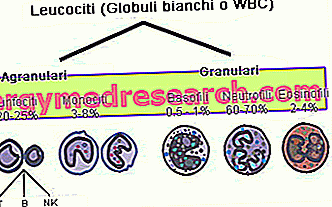Definition
In the medical field, the term peritonitis refers to an acute infectious-inflammatory process affecting the peritoneum, the membranous lining that covers the abdominal cavity and the organs it contains. When left untreated, peritonitis can give fatal results.
Causes
Following the perforation of an organ contained in the abdominal cavity, it is possible to witness a bacterial or fungal proliferation, responsible for a contamination of the peritoneum. In some cases, peritonitis is a direct complication of serious diseases. Peritonitis can also result from continuous irritation from contact with gastric juices.
Risk factors for peritonitis: appendicitis, cirrhosis, ulcerative colitis, diverticulitis, gallbladder disease, intestinal obstruction
Symptoms
The severity of the symptoms depends on the violence with which inflammation occurs; in the case of primary peritonitis, the subject complains of abdominal pain and swelling, fever and loss of appetite. The acute secondary form is more violent: diarrhea, difficulty urinating, dehydration, emesis, high fever, severe abdominal cramps, meteorism, oliguria, abdominal muscle stiffness, intense thirst and dark urine.
Serious complications: hypovolemic shock and patient death
Information on Peritonitis - Drugs for the Treatment of Peritonitis is not intended to replace the direct relationship between health professional and patient. Always consult your doctor and / or specialist before taking Peritonitis - Drugs for the treatment of Peritonitis.
drugs
For the treatment of acute proliferative peritonitis, the patient is generally subjected to surgery, associated with a powerful antibiotic therapy; the intervention involves the removal of the source of contamination or, in other cases, the removal of the entire infected organ.
Treatment for acute peritonitis without bacterial proliferation essentially involves the administration of antibiotics, in addition to respiratory therapy and hydration by intravenous infusion of electrolytes and liquids, lost due to vomiting and diarrhea.
Aminoglycosides:
- Amikacin (eg Chemacin, Mikan, Likacin) the administration of this antibiotic drug is indicated for the treatment of peritonitis associated with peritoneal dialysis. For patients on continuous ambulatory peritoneal dialysis (CADP), inject 24 mg / L intraperitoneally (for subjects with anuria) and 30 mg / L for non-anuric patients. For patients on intermittent peritoneal dialysis, the dosage is different: 2 mg / kg per exchange per day for anuric patients and 2.5 mg / kg for non-anuric patients. Do not exceed 1.5 grams per day.
- Gentamicin (eg Gentamicin, Ciclozinil, Genbrix, Gentalyn): for CADP patients, the recommended dose is 0.6-0.75 mg / kg intraperitoneally, once a day or 16-20 mg every 2 liters of dialysis fluid. Alternatively, take the drug intravenously: 2 mg per kilo (loading dose), followed by 1.7 mg / kg ev every 8 hours or 5 mg / kg ev every 24 hours. Therapy should generally be continued for 14 days. After stabilization of the patient, intravenous therapy can be converted into an oral therapy.
- Tobramycin (eg Tobi Podhaler, Bramicil, Nebicina) indicated for the treatment of peritonitis associated with chronic lung diseases from Pseudomonas aeruginosa. Intravenously, the recommended dose is 2 mg / kg (loading dose), followed by 1.7 mg / kg IV, every 8 hours or 5 mg / kg IV every 24 hours. In general, the duration of therapy is 14 days. For patients on CADP, the recommended dose of medication is 0.6-0.75 mg / kg intraperitoneally, once a day or 16-20 mg every 2 liters of dialysis fluid
Cephalosporins : these antibiotics, a third-generation species, are the drugs of choice for the treatment of bacterial peritonitis
- Cefazolin (eg Cefazolin GRP, Cefazil, Nefazol) first generation cephalosporin. It is recommended to take the drug at the dosage of 1-2 g ev every 6-8 hours. Do not exceed 12 grams per day. The duration of therapy is generally 2 weeks.
- Cefuroxime (eg. Cefoprim, Tilexim, Zoref, Zinnat): second-generation cephalosporin. Take the drug at a dose of 750-1500 mg intravenously every 8 hours, for 10-14 days. For CAPD patients in the context of peritonitis, take 1 gram every 2 liters of dialysis fluid intraperitoneally, followed by a maintenance dose of 150-400 mg per 2 liters of dialysis fluid.
- Cefotaxima (eg Cefotaxima, Aximad, Lirgosin): third generation cephalosporin. Take 1-2 grams ev every 6-8 hours. Do not exceed 2 grams ev every 4 hours. The duration of therapy is between 5 and 14 days. For dialysis patients in the context of peritonitis, the recommended dose is 500 mg every 2 liters of dialysis fluid intraperitoneally (for continuous CADP), or 2g / liter dialysis fluid for subjects on intermittent peritoneal dialysis.
- Ceftriaxone (eg Ceftriaxone, Pantoxon, Ragex, Deixim) third-generation cephalosporin. Take the drug at a dose of 2 grams intravenously once a day for 10-14 days. For patients on continuous dialysis, take 1 g / 2 liters of dialysis fluid intraperitoneally, followed by 250-500 mg on 2 liters of liquid. In the case of intermittent peritoneal dialysis, inject 1 gram every 2 liters of dialysis fluid every 24 hours, again intraperitoneally.
For the treatment of fungal peritonitis
Fluconazole (eg Diflucan): indicated to treat peritonitis caused by fungi such as Candida albicans. Take 50-200 mg of the drug orally or intravenously once a day. The duration of treatment should be established by the doctor.
Therapeutic schemes for the treatment of peritonitis
Below are some examples of therapeutic schemes: the doctor chooses the most appropriate combination of antibiotics to treat peritonitis, based on the associated diseases, the responsible bacterium and the patient's response to treatment. The dosage and duration of treatment are established by the doctor.
- Clavulanic acid + Amoxicillin (eg Clavulin, Augmentin) to be taken intravenously
- Quinolones (eg. Norfloxacin: eg Norflox, Flossac, Sebercim; Ciprofloxacin: eg Ciprofloxac, Samper, Ciproxin, Kinox): indicated to prevent peritonitis in patients at risk (with cirrhosis)
- Cephalosporins + Metronidazole (eg Metronid, Deflamon, Flagyl)
- Vancomycin (eg Vancocin, Zengac, Maxivanil) + Ceftazidime (eg Etazim, Liotixil, Fribat): for peritonitis associated with peritoneal dialysis
- Vancomycin (added to the dialysis liquid) + Ciprofloxacin (to be taken per os. Ex. Ciprofloxac, Samper, Ciproxin, Kinox): for peritonitis associated with peritoneal dialysis
- Ticarcillin + clavulanic acid (eg. Clavucar, Timentin): it is recommended to take 3.1 grams intravenously every 4-6 hours. The duration of peritonitis treatment varies from 1 to 2 weeks depending on the nature of the infection.



